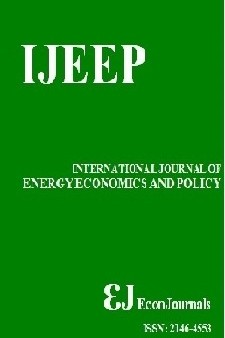Barriers and Policy Drivers to Energy Efficiency in Energy Intensive Turkish Industrial Sectors
Barriers and Policy Drivers to Energy Efficiency in Energy Intensive Turkish Industrial Sectors
Energy efficiency, Barriers, Industrial energy policy Turkey,
- Başlangıç: 2011
- Yayıncı: İlhan ÖZTÜRK
Waste Bank: Waste Management Model in Improving Local Economy
Dwi Wulandari, Sugeng Hadi Utomo, Bagus Shandy Narmaditya
İsmail Tijjani IDRİS, Sabri NAYAN
Yusuf Opeyemi Akinwale, Ibikunle Olalekan Ogundari
The Lebanese Pre-salt Oil and Gas Production Economic Challenges and Revenues
Consequences of Oil and Food Price Shocks on the Ecuadorian Economy
Jesser Roberto Paladines Amaiquema, Alexander Ruben Paladines Amaiquema
Testing the Shock Effect of Some Policy Variables on Electricity Generation in Nigeria
Samuel Nnamdi Marcus, Amachukwu Chibuzo Okezie
Transforming Waste Management Operations to Green Energy Initiatives: Opportunities and Challenges
Jy Shing Wu, H. K. Tseng, J. C. Ferrell, X. Liu
Time Span does Matter for Offshore Wind Plant Allocation with Modern Portfolio Theory
Lana V. L. Costa-Silva, Vinicio S. Almeida, Felipe M. Pimenta, Giovanna T. Segantini
Olusola Joshua OLUJOBİ, Olabode Adeleke OYEWUNMİ
The Relationship of Economic Growth with Human Development and Electrıcıty Consumptıon in Indonesia
